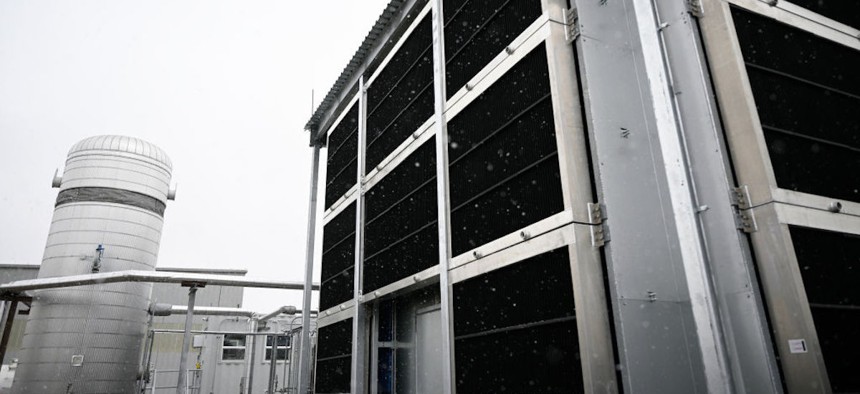States should invest in an ‘all of the above’ climate strategy

Global Thermostat unveils its commercial-scale direct air carbon capture facility on April 4, 2023 in Brighton, Colorado. The facility pulls in air and collects carbon dioxide to store or to use for industrial purposes to help address climate change. Photo by RJ Sangosti/MediaNews Group/The Denver Post via Getty Images
COMMENTARY | Rather than tinker around the edges of dealing with climate change, it is time for states to throw everything they have at the issue to stave off further—and permanent—damage.
This summer, triple-digit temperatures have baked the south and west, and record floods have raged up and down the eastern seaboard. Faced with increasing evidence of the effects of greenhouse gasses, leaders at all levels of government must commit to an “all of the above” climate strategy. They must use the innovation and technology available now and do so quickly.
For example, the capability—and opportunity—already exists to take carbon directly out of the air, liquify it and then store it safely deep underground.
A carbon dioxide removal pilot project in California is projected to remove 30 tons of CO2 from the air and produce 300 tons of water per year as a byproduct. Partially funded by the Department of Energy, the pilot’s end goal is to produce commercial units capable of removing 300 tons of CO2 per year while generating 1,500 tons of water. In addition to reducing carbon in the atmosphere, this system can also be deployed in areas subject to droughts, creating a double benefit.
If there was ever a time to invest in every possible solution, it is now. The Inflation Reduction Act, or IRA, signed by President Joe Biden creates key incentives for industries to invest in carbon capture technologies, including tax credits based on how much carbon is captured.
Members of the NewDEAL network of state and local policymakers that I lead have also shown how states can embrace new technology to address global warming.
Josh Boschee, North Dakota’s House minority leader, has touted a project that can capture 90% of carbon dioxide from a coal-powered power plant before it is released into the atmosphere. According to Boschee, the effect is “the same as taking 800,000 cars off the road.”
States and localities can also follow the IRA’s lead by adding their own carbon dioxide reduction incentives.
For example, Colorado state Sen. Chris Hansen, championed the Carbon Management Act, which was recently signed into law. This legislation ensures carbon dioxide removal, carbon storage, carbon capture and carbon utilization projects receive funding through the state’s clean air grant programs. Further, the new law requires the Colorado Energy Office to develop a strategy to remove greenhouse gasses like carbon dioxide directly from the atmosphere.
The world has moved past warning about a coming climate crisis, and people are now living in the crisis, with temperatures making July the hottest month in recorded history. Ocean temperatures are off the charts, and as Carlo Buontempo, the director of the European Union’s Copernicus Climate Change Service, has said, the world is “walking into an uncharted territory.”
Rather than tinker around the edges of dealing with climate change, it is time to throw every solution available at the issue to stave off further—and permanent—damage.
The president’s leadership at the federal level is admirable and should be applauded. The IRA is the nation’s largest investment in clean energy in the nation's history. The bill provides funding for a wide range of activities—from more electric cars on the road to improving the electric grid to replacing old school buses with clean energy electric ones.
At the same time, states and cities have models to follow to do their part in pursuing an all-of-the-above approach. Massachusetts is leading the way with wind energy investments while Milwaukee’s Climate and Equity Plan includes efforts like construction of energy-efficient homes and electric vehicle charging stations, and Lincoln, Nebraska, is turning biogas into vehicle fuel.
Carbon removal technology, combined with cleaner energy production and investments in energy efficiency, can help turn the tide against the worst of climate change.
Whether through powerful storms, massive droughts or spikes in global temperatures, Mother Nature is doing everything she can to warn us that change is urgently needed. For the sake of humanity, let’s listen to her.
Debbie Cox Bultan is CEO of both The NewDEAL and the NewDEAL Forum. The NewDeal supports a national network of 200 rising state and local officials selected for their innovative, results-oriented approach to governing. The NewDEAL Forum is a nonprofit that identifies and promotes innovative, future-oriented state and local pro-growth progressive policies.
NEXT STORY: What to expect in the first year of cannabis legalization





